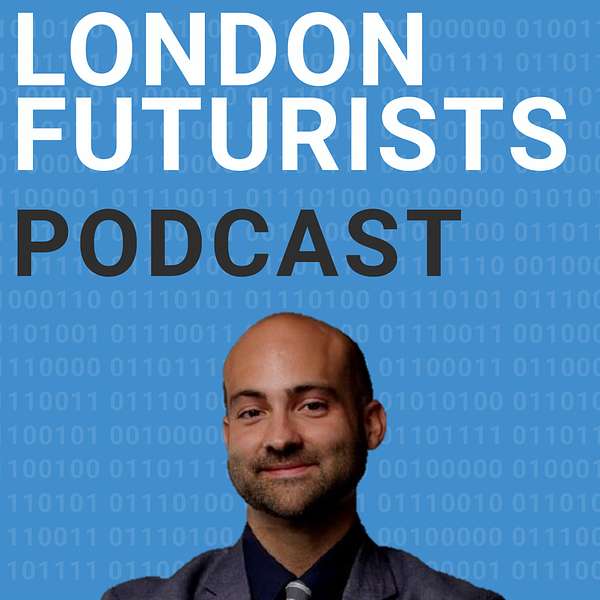
London Futurists
Anticipating and managing exponential impact - hosts David Wood and Calum Chace
Calum Chace is a sought-after keynote speaker and best-selling writer on artificial intelligence. He focuses on the medium- and long-term impact of AI on all of us, our societies and our economies. He advises companies and governments on AI policy.
His non-fiction books on AI are Surviving AI, about superintelligence, and The Economic Singularity, about the future of jobs. Both are now in their third editions.
He also wrote Pandora's Brain and Pandora’s Oracle, a pair of techno-thrillers about the first superintelligence. He is a regular contributor to magazines, newspapers, and radio.
In the last decade, Calum has given over 150 talks in 20 countries on six continents. Videos of his talks, and lots of other materials are available at https://calumchace.com/.
He is co-founder of a think tank focused on the future of jobs, called the Economic Singularity Foundation. The Foundation has published Stories from 2045, a collection of short stories written by its members.
Before becoming a full-time writer and speaker, Calum had a 30-year career in journalism and in business, as a marketer, a strategy consultant and a CEO. He studied philosophy, politics, and economics at Oxford University, which confirmed his suspicion that science fiction is actually philosophy in fancy dress.
David Wood is Chair of London Futurists, and is the author or lead editor of twelve books about the future, including The Singularity Principles, Vital Foresight, The Abolition of Aging, Smartphones and Beyond, and Sustainable Superabundance.
He is also principal of the independent futurist consultancy and publisher Delta Wisdom, executive director of the Longevity Escape Velocity (LEV) Foundation, Foresight Advisor at SingularityNET, and a board director at the IEET (Institute for Ethics and Emerging Technologies). He regularly gives keynote talks around the world on how to prepare for radical disruption. See https://deltawisdom.com/.
As a pioneer of the mobile computing and smartphone industry, he co-founded Symbian in 1998. By 2012, software written by his teams had been included as the operating system on 500 million smartphones.
From 2010 to 2013, he was Technology Planning Lead (CTO) of Accenture Mobility, where he also co-led Accenture’s Mobility Health business initiative.
Has an MA in Mathematics from Cambridge, where he also undertook doctoral research in the Philosophy of Science, and a DSc from the University of Westminster.
London Futurists
Where are all the Dyson spheres? with Paul Sutter
In this episode, we look further into the future than usual. We explore what humanity might get up to in a thousand years or more: surrounding whole stars with energy harvesting panels, sending easily detectable messages across space which will last until the stars die out.
Our guide to these fascinating thought experiments in Paul M. Sutter, a NASA advisor and theoretical cosmologist at the Institute for Advanced Computational Science at Stony Brook University in New York and a visiting professor at Barnard College, Columbia University, also in New York. He is an award-winning science communicator, and TV host.
The conversation reviews arguments for why intelligent life forms might want to capture more energy than strikes a single planet, as well as some practical difficulties that would complicate such a task. It also considers how we might recognise evidence of megastructures created by alien civilisations, and finishes with a wider exploration about the role of science and science communication in human society.
Selected follow-ups:
Paul M. Sutter - website
"Would building a Dyson sphere be worth it? We ran the numbers" - Ars Technica
Forthcoming book - Rescuing Science: Restoring Trust in an Age of Doubt
"The Kardashev scale: Classifying alien civilizations" - Space.com
"Modified Newtonian dynamics" as a possible alternative to the theory of dark matter
The Elegant Universe: Superstrings, Hidden Dimensions, and the Quest for the Ultimate Theory - 1999 book by Brian Greene
The Demon-Haunted World: Science as a Candle in the Dark - 1995 book by Carl Sagan
Music: Spike Protein, by Koi Discovery, available under CC0 1.0 Public Domain Declaration
PodMatch Automatically Matches Ideal Podcast Guests and Hosts For Interviews

